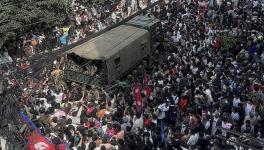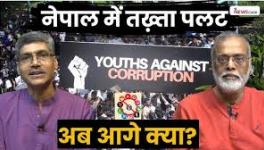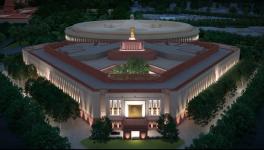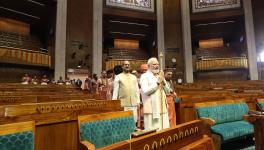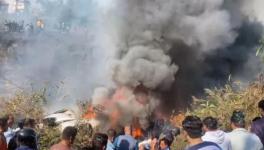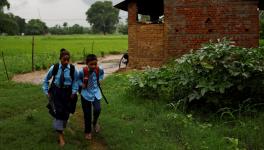Interview with Prashant Jha on political developments in Nepal
Transcript of the Interview with Prashant Jha on Political Developments in Nepal Srinivasan Ramani
(SR) - Hello and welcome to Newsclick. It's been nearly three years now since the popular Constituent Assembly was elected in the Republic of Nepal. The initial expectation was that the constitution would be written very soon, while the national consensus government would shepherd the nation through this process. But unfortunately, there has been a lot of political turmoil. Only recently, a third government was elected to power. To discuss the political turmoil and the situation there, we have with us Prashant Jha, the correspondent of Hindu Newspaper, based in Kathmandu, and also the regular columnist of the popular newspaper Nepali Times. Hello, Prashant.
Prashant Jha (PJ) - Thank you.
S - This has been third iteration of a government that has been elected to the government since the elections, and there has been no consensus. What do you think the major factors are that are eluding consensus in Nepal.
PJ - I think the turning point was the elections which were held in April 2008. Before the elections, there were contestations, differences, the Maoist and the other political parties were able to work together and were able to draft a peace agreement. What happened after the elections was the fear and the insecurity of the other party the arrogance and the ambition of the Maoists ended up breaking the consensus, I think. The calculation of the other parties was that the Maoists will fare a distant third, the Maoists ended up being the largest party. They had almost double the seats. They have more than NCA and UML put together. This led to insecurity that Maoists would end up consolidating power and this would be irreversible which basically broke the consensus. On the Maoists side, you had certain missteps, I think, which went beyond the mandate, the unwritten agreement that they had drafted and signed up to before the elections. Just to reiterate a few instances, the Maoists had promised Girija Prasad Koirala the Presidency. They ended up not giving it to the NCA and backing another candidate. That led to a lot of trust deficit between NCA and the Moists. NCA in turn did not leave space for the Maoists till four months after the elections. So it was only in August that G.P Koirala gave way to Prachan da. That made Maoists feel that these guys would never give us power. The congress then asked for the Defence Ministry. The Maoist then did not give the Defence Ministry and kept the Defence Ministry with themselves. So I am just highlighting these details to illustrate that the two key actors of the peace process who conceptualised the twelve point agreement the Nepali Congress and the Maoists fell out. I think, that's where the consensus broke. But let me just say two more things. If that was one relationship, the NCA and the Maoists. There were two other relationships that guided the process in beginning. The Nepal Army - Maoist relationship, which was not one of the cooperation, which was not one of confrontation in the earlier years of the peace process but when they came to power they took certain steps which army thought was hostile to their interests and when they tried to dismiss the army chief, the army chief bounced back and politically mobilised the other parties and the relationship between Maoists in India. These three relationships deteriorated and led to the collapse of the consensus.
SR - The interesting part is these were during the initial days after formation of the CA. One expected that because of the process was getting elongated, political logic will force these forces to come to a cementing bond and a consensus would happen then but it never happened then.
PJ - I think, one of the factors that had happened after the elections is what bonded all these parties is the fear of common enemy which was the monarchy. After the elections, the monarchy was abolished. Then, these parties began to see each other as the enemy or the political rival or as the force which has to be competed with for the space on the ground. So I think ironically, the abolition of the monarchy led to the collapse of the consensus.
SR - Having said that, the past six or seven months has been one of you know the series of rounds of farcical contestation for the post of PM and there was no PM who could be elected. Only off late, you had Jhalanath Khanal of the UML being elected PM, with the support of the Maoists. Some said there was some ideological cohesion in this arrangement and possibly this could last. What do you think would happen?
PJ - I think, the problem with this alliance, I think this alliance is a good news because this alliance broken the stagnation of past seven months that you mentioned. But, the problem with this alliance is that both the UML and to the lesser extent the Maoists are no longer coherent parties there is lot of internal dissension within the UML. The UML is torn between the radical communist roots and a faction which has taken a very strong rightward tilt. I would not say they have gone to a liberal democracy but a very strong rightward tilt which faction that is headed by K.P. Oli and which Madhav Nepal has also supported in the past. Now, this is a government, this is a same party which has before six months ago before Jhalanath Khanal was sworn in was leading the anti Maoist coalition. And today is the same party that is in alliance with the Maoists. Jhalanath Khanal's space to manoeuvre, to implement the deal which he has signed with the maoists to push certain ideological agenda which you have put it is very limited because there are dissensions within their own party and which is why there is no cabinet till now. So while it is good news, he will have a very tough time reconciling the interests of this faction within UML with the demands the Maoists are making on him and how he does that will determine the composition, character and stability of this government.
SR - How about the constitution writing process in itself? Has the CA ironed out certain differences that have bedeviled the common understanding on various issues between these various parties specifically the major parties, the UML, the Maoista and the Nepali Congress and on key issues such as federalism, the nature of government that will be formed? Has there been some progress in these areas?
PJ - I think there has been a lot of progress in constitution writing. There were eleven committees or eleven committees submitted their drafts. There were disputes within these committees but now the reports are with the Constitutional committee and the Constitutional committee has to reconcile these differences and prepare an integrated draft. After which the law makers will go back to the people and after public consultations will prepare a new draft. There has been a convergence in many issues. But as you said you have pointed out two major issues and there has been no convergence on these major issues yet. On the nature of government, the Maoists are asking for a directly elected President. The Nepali Congress wants to stick to a Westminster Parliamentary system. There is a minority view within the Nepali Congress led by a more progressive element. People like Pradeep Giri, Gagan Thapa who are saying the directly elected government is essential for the stability of the country. There is also some discussion in Kathmandu among political leaders is in favour of the semi presidential system, the French model where the president could be elected directly by the people. There is a strong parliament when Prime Minister is directly elected by the people. There could be possible compromises but discussions have not got till there. On Federalism, the committee has decided that identity and capability would be the two criteria to discuss the nature of the state. There would be a lot discussion on the power that to be given to the states. The nature of Federalism, the boundaries of the states and the names to given to the states and who would be elected as chief minister for in the state for e.g. Maoists the dominant communities in the state must have prior rights. 'Agra Adhikar' that's the term they are using and the other parties are saying that it should be based on individual rights not on group rights and those are the key differences that still persists. One of the points that people who want to bring about a compromise are now talking about is preparing a framework constitution which is you maintain minimum consensus as many issues as possible. You leave some contentious issues for a statory structure commission or referendum or for future sovereign elected body to determine and amend the constitution subsequently. But just get what you can get right now and but I don't know that would be feasible there will be forces that will oppose it people in Tarai for e.g. will see it as a sell out, “you postponed federalism which is what we really want”. So whether it is possible to postpone federalism, I think on constitutional writing, these issues will be a challenge.
SR- How about the other hindrance the other key issue that has gripped the polity the integration of former Maoist combatants into or integration or even rehabilitation? Has there been some agreement on this issue among these parties?
PJ - One of the provisions that Maoists could constitute a separate security force or they constitute a one force which consists of Maoists combatants as well as personnel from other security organs to create a mixed force but there is already opposition to that because people in NCA and army feel that this would lead to a creation of a parallel force and Maoists could retain their strength. The problem with integration is threefold - The nature, the modality and the timing. Let's begin with the timing. The Maoists are saying the constitution writing and integration has to proceed simultaneously and power structure. All these things are linked. Give us a share in power structure give us guarantee that constitution will be drafted and we will move on integration and the other side is saying the integration first. You give up your cohesive apparatus and only then we will give you your share in power structure or write. Constitution writing is not possible before if one party is still has its fighting force. Modality, whether the Maoists is presented four modules, one model is merger of the PLA or NA to create a national army the other party says that no way Nepal Army is the national army and you guys are just combatants. The second model of the Maoists presented is unitwise entry into Nepal army where based on certain standard norms which should be decided by the special committee which has been set up to take this matter forward. The other parties say that the entry of combatants will not be on unit based but it will be based on individual norms. The individual combatants of the Maoists army who passed the standard norms already set by the Nepal army can be recruited but the Maoists have rejected that. The third model of the Maoists presented is the separate force which I have earlier said that there is a fear that it will be parallel force and there is this mixed force idea. So the nature, the modality and the timing all three remain contentious but it is quite clear that till there is a broader deal on integration, the constitution cannot be written.
SR - The UNMIN, The United Nations Monitoring Force that actually brokered the peace agreement in some sense is no longer in Nepal now, it's term actually expired. Do you think the leaving of the UNMIN from the country would actually effect this settling of this question in particular, the integration or rehabilation?
PJ - Just one clarification, the United Nations mission in Nepal's term expired on January 2008 and it was extended seven times. The government, this time, choose not to request the security council to extend it. Now, the UNMIN's mandate was very limited. All UNMIN was doing was monitoring both the management of both the Nepal army and the PLA. The chain of command of the Nepal army and the PLA was in the hand of the respective leadership. So the UNMINS exit did not lead to a collapse of the process. But, some of us have been arguing that it is important for UNMIN to stay on because UNMINS played a symbolic role as well. It was symbolic deterrent against the large scale resumption of violence. It kept all parties locked into a peace agreement it was an important pillar of the peace process. I think if UNMIN have stayed on, it could have played major role, both symbolically as well as providing technical expertise in this process of rehabilitation and this peace process. Integration is not a new thing it has happened in many countries across the world and UN has a degree of international experience that some of us in Nepal may lack. Till this process had completely wrapped up I think it would have been best if UNMIN stayed on. A range of factors both domestically and internationally where sections in Delhi also did not wanted UN Presence in the neighbourhood for such a long time. All of it came together.
SR - Let's talk about that issue, the elephant in the room, that's the role of India in this whole process. What do you think has been Indian's contribution in this whole process post the formation of Constituent Assembly? Can you tell us in brief how the Indian Government, I mean the Indian Embassy acted in this whole process.
PJ - I would say that India played a constructive role pre the formation of constituent assembly. I would say that India played a destabilising, counterproductive, even destructive after that. To give it credit, India did accept the formation of the Maoist led government. It gave red carpet treatment to Prachan da. But the problem, I think, has been that the trust deficit between India and the Maoists grew exponentially during the duration of the Prachan da government specially in later months. India began to feel that the Maoists were not committed to the peace agreements, The Maoists were not committed to democracy, the Maoists would not be sensitive to their security interest when the Maoists tried to cosy up to China and I think policy makers here felt that they could not allow in their terminology an unreformed strong Maoist force in power with it's military apparatus across the open border. Since and when the Maoists tried to dismiss the army chief, India invested a lot of political capital in getting all the forces to oppose it and destabilising the Prachan da government. India has decided that keeping the Maoists out of power in order to tame them, in order to weaken them, in order to reform them would take precedence over the peace and constitutional process. Now we have been critical of that because we believe that the Maoists are the largest elected party and giving them space in the power structure is the way to reform them. There are problems with the Maoists party, there is still a degree of violence and intimidation and it is important to challenge that. But the way to do is not to force them out of the political structure and you know you put a gun on somebody and say, now you surrender your source of power Now you give us this - the guy is insecure. This is in one way dishonouring the mandate. It is dishonouring the mandate, in principle, it is dishonouring the mandate which is a problem, it is going against the democratic ... which is what India is claiming it is standing for. Diplomatically, Indian intervention goes against any norms of diplomacy and inter state relations. The way they have mobilised and micro manage politics. Tactically, I don't think it is the best way to get the Maoists on board. The Indian strategy of the past two years has only strengthened the dogmatic faction within the Maoists who keeps says that Bourgeoisie democracy is a sham and Indian expansionism is the main problem I think, the Indian actions have contributed to it. This is not to say India does not have a role in Nepal. India has a role. Each political actor looks for India’s role. I mean the Maoists are very happy when India helps sign the, facilitated the twelve point agreement. India has a role but it has to be more constructive and I think there has to be a rethinking. As a journalist you must be meeting a lot of people in Nepal. I remember I met a quite a few people just before the Constituent Assembly was convened. There was a lot of hope and excitement about this whole process. But a lot of water has flown below the bridge now.
SR - Are the people still patient about this whole process? What's your perception about how the politicians have performed this past two and a half years?
PJ - I think there is a very high degree of apathy. People are just apathetic and disillusioned. To a large extent they have lost faith in the change of 2006 and the elections which you were referring to. There is a feeling that all the politicians are same. They are again looting the state. They are not committed to bringing about the real transformation and radical change that they have promised. Day to day living is something that the citizens are really concerned about more than drafting this constitution. I think on that the government indicators have been so abysmal. the sixteen hour, fourteen hour power cuts in Kathmandu every day. The law and order situation in the Tarai is problematic. There are everyday thousand people leave the country in search of jobs. There is massive out migration and remittance is the only thing that is sustaining the economy. There is very little employment generation within the country. Inflation is soaring, coupled with these day to day challenges which people are facing in their lives. Then there are larger questions where they can see whether the politicians are not getting their act together and that consensual spirit is not coming back which is necessary to institute the changes that have happened in 2006 and move forward towards what Maoists call which many agree and which is the main priority which is economic revolution of sorts.So I think there is a very high degree of apathy.
SR - Thank you Prashant for explaining the political situation in Nepal today and as you said the people are getting frustrated and that is reflected in their way politicians are getting and shoes are being in public meeting in so on and so forth. We will keep calling you again because the constitution writing process is still on. May be that you can keep telling the situation in Nepal. Thank you so much.
Get the latest reports & analysis with people's perspective on Protests, movements & deep analytical videos, discussions of the current affairs in your Telegram app. Subscribe to NewsClick's Telegram channel & get Real-Time updates on stories, as they get published on our website.











